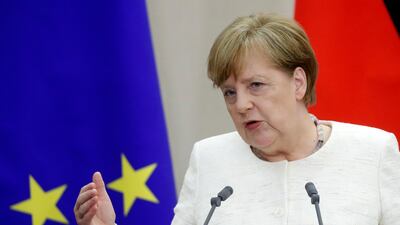Pressure on Hezbollah from the US Treasury was ratcheted up three times last week. Key financiers and entities tied to the group were targeted by Washington in a clear effort of containment against the Lebanese outfit.
The moves should be linked to the US decision to leave the 2015 nuclear deal with Iran. The decision draws a line in the sand against Iranian aggression outside its borders.
A second clear line that confronts Europeans now is related to Iran’s Hezbollah proxies.
Hezbollah has been a key motor of Iranian influence as it has expanded its web of activities throughout the world in recent years.
Some of the entities affected by sanctions issues last Thursday for activities in West Africa are also active in Europe.
Among them, an Antwerp-based company, Global Trading Group NV, issued a denial that it was involved in terror networks after it was put on the Treasury notice.
The ball is now in the Dutch court. The Treasury crackdown raises the question of whether Europe can resist American pressure on Hezbollah in the same outright way it has over the Iran deal.
A few days earlier, the Terrorist Financing and Targeting Centre, the US body that includes the UAE and the region, issued joint sanctions on Hezbollah's Shura Council.
As Steven Mnuchin, the US Treasury Secretary, made clear, this action was a rejection of the "false distinction" between a political wing and terrorist plotting. The point is Hezbollah is banned as a military entity in much of Europe but its political wing is permitted to function.
Yet it means that someone can carry the Hezbollah flag down the street in London – even though the Hezbollah flag is adorned with a Kalashnikov.
As in so much else, there is a single European facade but changes are afoot. Some pressures are threatening to Hezbollah but elsewhere there is much in the group’s favour.
Pressure is building on the British government to take outright action against Hezbollah. MPs backed the idea in a debate in January. While the government has so far stood aloft, policymakers sound more open to the idea than before.
Across Europe, the picture is also mixed, although there are notable blackspots.
National governments are breaking down the unified European sanctions regime. The new coalition agreement being thrashed out in Rome has a clause that calls for the reversal of sanctions on Russia.
It is a position that the Greek government, which is also drawn from the radical and anarchist left, has long occupied. The dissident perspective is spreading.
Iran has been wooing the Greeks for years. It has even proposed a natural gas pipeline running from its territory through Iraq and Syria to Greece.
Age-old trading and cultural ties mean Greece is an important partner for Iran. It is unlikely that Athens would participate in any move to ban Hezbollah as a proscribed organisation and the prospect is that it will gain Rome as a powerful ally in the coming weeks.
Yet like the British, the bigger European countries could move in the direction of proscribing Hezbollah.
The Dutch government has been tougher on the group than other states and now faces the challenge of implementing the latest US sanctions directed at a company on its territory.
In the days running up to US President Donald Trump’s decision to withdraw from the Iran nuclear deal, the issue of Hezbollah was raised when German Chancellor Angela Merkel travelled to Washington to avert a confrontation with America.
There are an estimated 950 active Hezbollah operatives in Germany alone. These operatives are free to engage in fundraising and business activities.
Thus a group backed by Iran can also rely on a powerful nationwide platform in Europe's biggest economy.
German officials have resisted pleas from their US counterparts for action.
It feels like a choice that is not build on rational self-interest but instead on complacency of bureaucrats.
Officialdom is attempting to maintain its own distinctive foreign policies in the face of its own strategic interests.
It underlines the fact Mr Trump’s Iran decision has put the two biggest trading power blocs at odds. Europe has chosen a perplexing logic to underpin its response. The bloc has chosen to nurture its commercial ties with Iran, even if it is at the possible cost of a trade war with Washington.
While there has been great scrutiny on the gambit to pull out of Iran deal, the push against Hezbollah is kicking in very quickly.
The movement on Hezbollah activities in Europe will escalate very quickly.

